
Italian postcard by Ed. Traldi, Milano, no. 39. Photo: Civirani, Roma. Photographer Carlo Civirani was the father of set photographer, producer, and director Osvaldo Civirani.
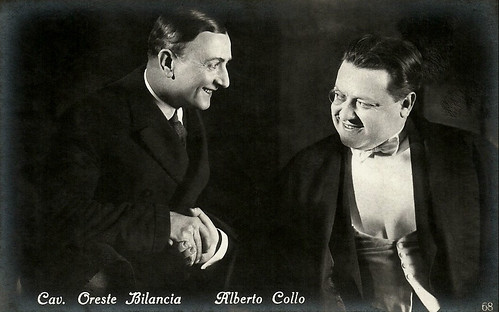
Italian postcard by Ed. Traldi, Milano, no. 68. With Oreste Bilancia.
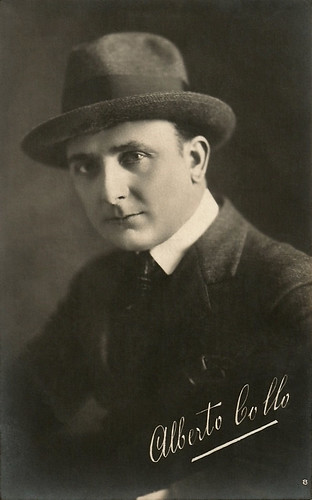
Italian postcard by Fotocolore, Torino, no. 8.
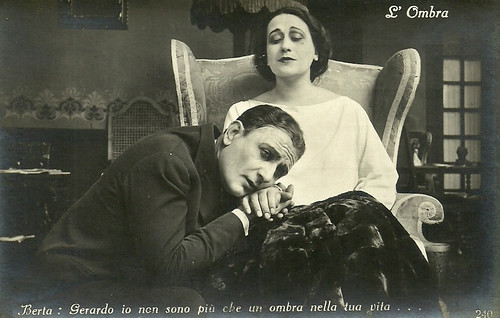
Italian postcard by Ed. Ballerini & Fratini, Firenze, no. 240. Photo: Alba Film. Alberto Collo and Italia Almirante Manzini in L'ombra/The Shadow (Mario Almirante, 1923). Caption: Berta: Gerardo, I am no more than a shadow in your life....
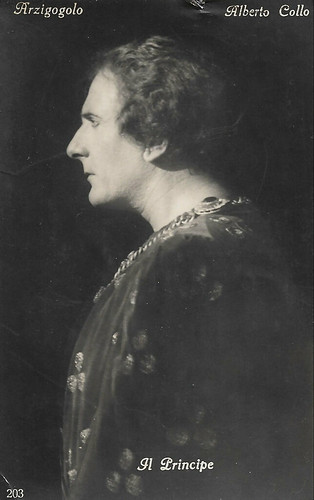
Italian postcard by Ed. Ballerini & Fratini, Firenze, no. 203. Photo: Alba Film. Alberto Collo as Prince Giano in L'arzigogolo/The Court Yester (Mario Almirante, 1924). Caption: The Prince.
The prima donna of the group
Alberto Collo was born in Piobesi Torinese, Italy in 1883. He came from a Bolognese family.
He started his career as an apprentice hairdresser. In 1907, Collo started to act on stage. He joined the company of Mario Testa, which performed dialect pieces. That same year he also began to work for Ambrosio Film, playing small parts in short silent comedies.
Two years later, in 1909, he moved to Giovanni Pastrone's Itala Film. First, he worked as a double for André Deed, later he played transvestite parts, cross-dressing as a woman. According to German Wikipedia, he was "used as the prima donna of the group because of his feminine features and ethereal charisma".
Between 1912 and 1924, however, he became one of the protagonists of the Italian silent cinema, performing in over 70 films. First, these films were shorts and later feature-length films, mostly produced by Cines, then Celio Film, a company affiliated with Cines, and finally at the Fert company.
He worked with such directors as Baldassarre Negroni, Mario Almirante, Guido Brignone and Augusto Genina, and with actors such as Emilio Ghione, Oreste Bilancia, Francesca Bertini and Italia Almirante Manzini.
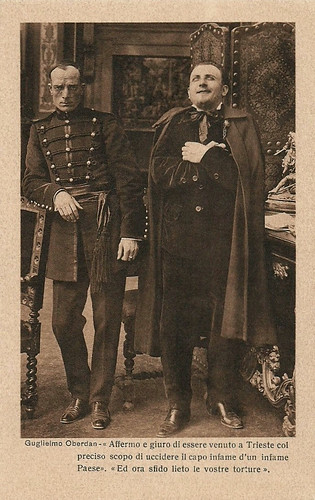
Italian postcard. Photo: Tiber Films. Alberto Collo (right) and Emilio Ghione (left) in Guglielmo Oberdan, il martire di Trieste/Oberdan (1915). Caption: Guglielmo Oberdan: "I admit and I swear to have come to Trieste with the exact scope of killing the infamous head of an infamous state. And now I happily challenge your tortures."
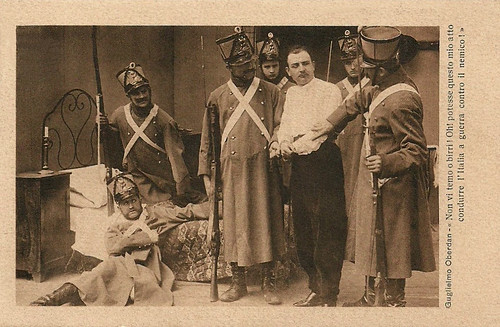
Italian postcard. Photo: Tiber Films. Alberto Collo in Guglielmo Oberdan, il martire di Trieste/Oberdan (Emilio Ghione, 1915). Caption: Guglielmo Obedan: "I don't fear you, you cops. If only my act could cause Italy to start a war with the enemy."

Italian postcard. Photo: Tiber Films. Alberto Collo as Oberdan and Ida Carloni Talli as his mother in Guglielmo Oberdan, il martire di Trieste/Oberdan (Emilio Ghione, 1915). Caption: "What shall I do, mamma? I will leave this oppressed land and will take care that my sacrifice will be worthwhile to redeem my brothers and sisters."

Spanish collectors card by Chocolate Pi, Barcelona, no. 1 of 6. Photo: Tiber Film. Ignazio Lupi, Floriana and Alberto Collo in Il potere sovrano/The Sovereign Power (Baldassarre Negroni, Percy Nash, 1916).

Spanish collectors card by Chocolate Pi, Barcelona, no. 3 of 6. Photo: Tiber Film. Diana D'Amore and Alberto Collo in Il potere sovrano/The Sovereign Power (Baldassarre Negroni, Percy Nash, 1916).
Triangle
In the early 1910s, Alberto Collo often formed a triangle in shorts directed by Baldassarre Negroni and with Francesca Bertini and Emilio Ghione co-acting, the latter mostly playing the bad guy. In Panne d’auto/Car breakdown (Baldassarre Negroni, 1912), flirtatious Kitty doesn’t know how to choose between engineer Alberto and officer Pietro. Pietro tries to impress Kitty with a daredevil car race but Alberto pretends to have a breakdown with his car, so Kitty joins him for a picnic and he has time to propose.
In Idolo infranto/The Artist's Model (Baldassarre Negroni, 1913), he plays a sculptor dumped by his capricious, gold-digging model (Bertini), has gone poor and is almost put on the street. When she returns and pretends to be his statue, he sees her in a mirror laughing at him, so enraged he destroys ‘the statue’.
In L’amazzone mascherata/The Woman Who Dared (Baldassarre Negroni, 1914), Collo is unjustly sentenced because of the loss of secret documents, so his wife (Bertini) comes to the rescue and, disguised as an amazon, she pursues the real culprit, a circus director (Ghione).
Collo had a small part in the well-known Neapolitan drama Assunta Spina (Francesca Bertini, Gustavo Serena, 1915), starring Francesca Bertini and Gustavo Serena.
He had the lead in the propagandistic period piece Oberdan/Guglielmo Oberdan, il martire di Trieste (Emilio Ghione, 1915), about a 19th-century Italian partisan who tried to kill the Austrian emperor Franz Joseph when the latter visited Trieste, but Oberdan was caught and hanged. Ghione himself played the Austrian governor of Trieste. As Italy was at war with Austria when the film came out, Oberdan was a huge success.
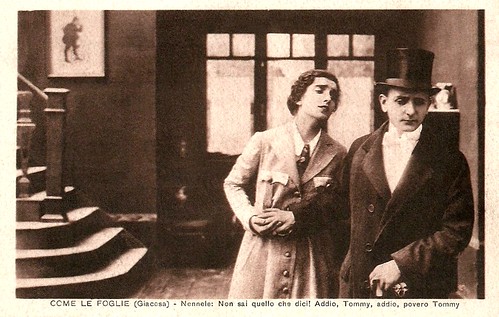
Italian postcard by Tiber Film, Roma. Photo: Maria Jacobini (Nennele) and Alberto Collo (Tommy) in Come le foglie/Like the Leaves (Gennaro Righelli, 1917). Caption: Nennele: "You don't know what you're saying! Farewell, Tommy, farewell, poor Tommy!"
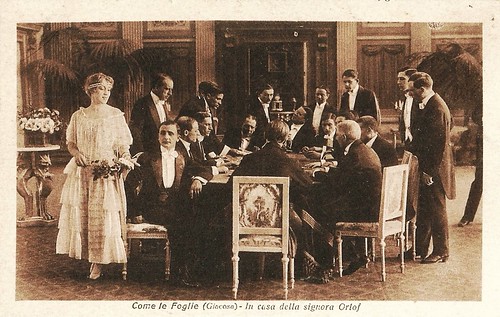
Italian postcard. Photo: Tiber Film, Roma. Alberto Collo as Tommy in Come le foglie/Like the Leaves (Gennaro Righelli, 1917). Caption: In the house of Ms. Orlof.
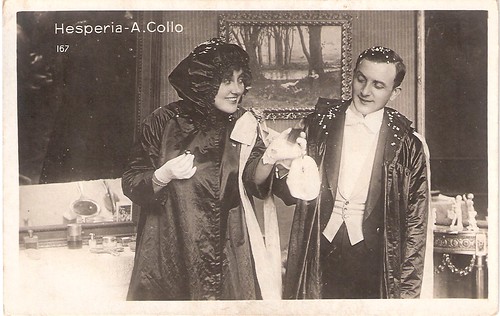
Italian postcard, no. 167. Photo: Hesperia and Alberto Collo in La cuccagna (Baldessare Negroni, 1917). It was an adaptation of Emile Zola's La curée. Hesperia is Renata/Renée, the second wife of the cunning and wealthy Saccard, who married young Renata for her money. She though has an affair with Saccard's son Max, played by Collo. In the end money triumphs instead of love, just as in Zola's novel. That's why some Italian critics thought the title La cuccagna (The Bonanza) was too cheerful, while La curée means: the loot.

Italian postcard by G.B. Falci, Milano / Fotominio, no. 47. Italia Almirante and Alberto Collo in La statua di carne/The Statue of Flesh (Mario Almirante, 1921). Noemi Keller's old flame begs her to give up her charade for Paolo, sitting each day like a statue in front of him, as she is the spitting image of his lost love Maria. But Naomi cannot give up, as she is developing a crush on Paolo.
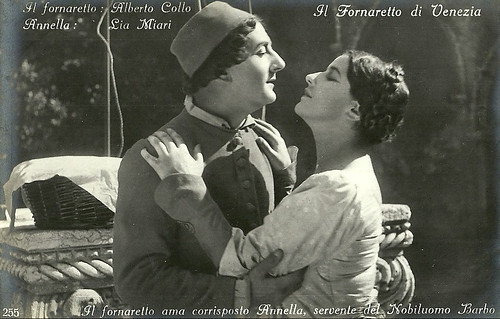
Italian postcard by G.B. Salci, Milano, no. 255. Alberto Collo as the baker boy and Lia Miari as Annella in Il fornaretto di Venezia/The Baker Boy of Venice (Mario Almirante 1923), an adaptation of the novel 'Il Fornaretto' (1846) by Francesco Dall'Ongaro. Caption: "The baker boy and Annella, maid of the nobleman Barbo, love each other."
Completely penniless and seriously ill
By the mid-1910s, Alberto Collo became a regular partner of Bertini’s rival Hesperia, whose films were directed by her husband, Baldassarre Negroni. Their films together include La signora delle camelie/Camille (Baldassarre Negroni, 1915), Il potere sovrano/The Sovereign Power (Baldassarre Negroni, 1916), and La cuccagna/The Bonanza (Baldassarre Negroni, 1917).
But Collo was also paired with Maria Jacobini, as in Come le foglie/Like the Leaves (Gennaro Righelli, 1917), and even more with her sister Diomira Jacobini, as in L’isola della felicità/The Island of Happiness (Luciano Doria, 1921) and La storia di Clo-Clo/The Story of Clo-Clo (Luciano Doria, 1923). In the early 1920s, Collo played in various films opposite Italia Almirante Manzini, a.o. as her jealous ex-lover in La statua di carne/The Statue of Flesh (Mario Almirante, 1921), a prince in La piccolo parrocchia/The Small Parish (Mario Almirante, 1923), and as Count Giano in the Sem Benelli adaptation L’arzigogolo/The Court Jester (Mario Almirante, 1924).
He also played in period pieces, such as the title role in the historical drama Il fornaretto di Venezia/The Baker Boy of Venice (Mario Almirante, 1923), and in the Maciste-films Maciste e il nipote d’America/Maciste's American Nephew (Eleuterio Rodolfi, 1924) and Maciste nella gabbia dei leoni/Maciste in the Lion's Cage (Guido Brignone, 1926), starring Bartolomeo Pagano.
At Fert, Collo played with a steady crew that included Oreste Bilancia and Pauline Polaire. When the film crisis hit the Fert studios as well in the mid-1920s, Collo stopped film acting. He formed a stage company with his partner and director Emilio Ghione, with whom he undertook various provincial tours until 1928. Between 1926 and 1939, Collo only sporadically returned to the cinema. In the post-war era, Collo obtained a few film parts between 1951 and 1955 in films like Arrivano i nostri/Ours are Coming (Mario Mattoli, 1951), starring Walter Chiari.
Completely penniless and seriously ill, Collo was brought back into the public consciousness in 1954 by a radio programme, in which donations were collected for him. The Italian President also supported the actor, but the hospitalisation he made possible was unsuccessful. Alberto Collo passed away in 1955 in Turin, at the age of 71 years. According to IMDb, Alberto Collo played at least in some 128 film titles, but certainly in many more, uncredited, in his early career.

Italian postcard by Ed. Ballerini & Fratini, Firenze, no. 232. Photo: Alba Film. Italia Almirante Manzini as Berta, Alberto Collo as Gerardo and Vittorio Pieri as Berta's godfather Michele in L'ombra/The Shadow (Mario Almirante, 1923). Caption: Berta: Don't you look, godfather! These are matters which don't concern you.

Italian postcard by Ed. Ballerini & Fratini, Firenze, no. 244. Photo: Alba Film. Italia Almirante Manzini as Berta, Liliana Ardea as Elena, and Alberto Collo as Gerardo in L'ombra/The Shadow (Mario Almirante, 1923). Caption: Berta [to Gerardo]: You shouldn't have done this! Raise another family... another home!

Italian postcard by Ed. Ballerini & Fratini, Firenze, no. 207. Photo: Alba Film. Italia Almirante as Monna Violante and Alberto Collo as Count Giano in L'arzigogolo/The Court Jester (Mario Almirante, 1924). Caption: Giano tries in vain to conquer Violante's coldness.
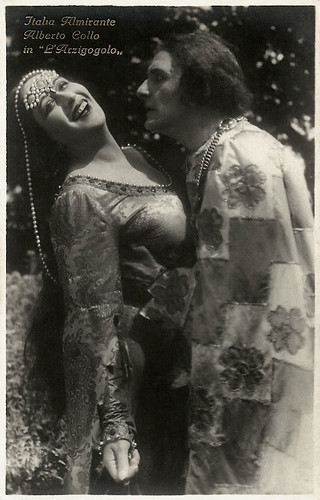
Italian postcard by G.B. Salci, Milano. Photo: Italia Almirante and Alberto Collo in L'Arzigogolo (Mario Almirante, 1924), an adaptation of the play by Sem Benelli.
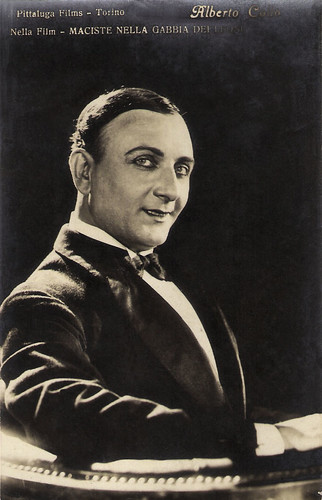
Italian postcard by Ed. A. Traldi, Milano. Photo: Pittaluga Films, Torino. Alberto Collo in Maciste nella gabbia dei leoni/Maciste in the Lions' Cage (Guido Brignone, 1926).
Sources: Aldo Bernardini/Vittorio Martinelli (Il cinema muto italiano - Italian), Wikipedia (Italian and German) and IMDb.
This post was last updated on 4 October 2023.
No comments:
Post a Comment